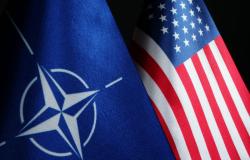People, Security and Borders: The Impact of the Western Hemisphere Travel Initiative on North America
Donald Abelson and Duncan Wood discussed their recently published report, "People, Security, and Borders: The Impact of the WHTI on North American," which assesses the potential economic, privacy, and technological implications of the controversial Western Hemisphere Travel Initiative (WHTI) on North America.
Overview
Governments on both sides of the border have to think more critically about the type of infrastructure required to create a safer and more secure border, argued Donald Abelson, professor and chair of political science at the University of Western Ontario. Professor Abelson was joined by co-author Duncan Wood to discuss their recently published report, "People, Security, and Borders: The Impact of the WHTI on North American," at a conference hosted by the Canada Institute, in partnership with Accenture, the Canada-U.S. Fulbright Program, and the Network on North American Studies in Canada, on May 30. The report assessed the potential economic, privacy, and technological implications of the controversial Western Hemisphere Travel Initiative (WHTI) on North America.
Based on recommendations from the 9/11 commission, the WHTI proposes to implement the provision passed in the Intelligence Reform and Terrorism Prevention Act of 2004 that requires all travelers into the United States to carry a passport or other form of identification that sufficiently denotes both their identity and citizenship. Under the 2007 Homeland Security Appropriations Act, all provisions included in the WHTI must be implemented no later than June 1, 2009.
Securing the Borders
The U.S.-Canadian border has often been referred to as "the longest undefended border in the world," a fact policymakers on both sides of the border have historically viewed with a great amount of pride. This sense of pride quickly turned to a source of concern and feeling of vulnerability, particularly among U.S. policymakers, following the events of 9/11, said Abelson.
Although both Canada and the United States want a secure border, there is a considerable amount of concern that the WHTI may serve to slow the flow of goods, services, and people between countries. Abelson cited recent figures released from the Conference Board of Canada, stating that, between 2005 and 2010, the tourism industry alone stands to lose $3.5 billion in Canada and $2 billion in the United States as a result of the WHTI. Abelson stressed that Canada and the United States must collaborate closely to ensure to that the WHTI does not slow the nearly $1.5 billion in trade that takes place daily across the Canada-U.S. border.
In addition to economic concerns, Abelson also urged Canada and the United States to engage the private sector and academic community to determine not only the type infrastructure required to secure the border, but its expected cost as well. He maintained that encouraging enrollment in programs such as NEXUS—a binational initiative designed to enhance security and improve traffic flow along the international border by reducing border-crossing waiting times for pre-assessed low-risk travelers—would be critical to the success of the WHTI. Kathleen Kraninger of the U.S. Department on Homeland Security said that while upgrading infrastructure along the northern border is imperative to the WHTI's success, raising the necessary investment and constructing an enhanced border infrastructure will take a considerable amount of time and resources to complete. She stressed that the WHTI must be implemented along the Canada-U.S. border in a way that enhances security, while mitigating the economic impact of the new travel regulations on northern border communities that depend on the free movement of people and goods across the border for their livelihood.
Duncan Wood of the Instituto Tecnológico Autónomo de México provided a Mexican perspective of the new travel regulations, noting that there is a considerable "lack of interest" in addressing the potential implications of the WHTI south of the U.S. border. Wood maintained that because Mexicans are already required to have official documentation to enter the United States, Mexican officials perceive the new travel regulations as a non-issue. Nevertheless, while the WHTI will not have an impact on Mexican travelers, there is potential for Mexican border communities to incur serious economic disruption as a result of the new travel regulations. Wood explained that American travel into Mexico for shopping and tourism may decline as a result of new travel regulations, which has the "potential for a serious disruption in border life" and could have a particularly severe impact on the Mexican travel industry. Both Wood and Abelson stressed that there is a critical need to spread public awareness of the provisions and potential implications of the WHTI in Mexico, Canada, and the United States.
Moving Toward Implementation
Ensuring that North Americans have the necessary documentation to meet WHTI requirements will be critical to maintaining the free flow of goods, services, and people across the U.S. border. According to the authors of the report, there are over 8,000 identity documents—ranging from hunting and fishing licenses to birth and baptismal certificates—that are currently used for entry into the United States. Although a general consensus exists that the current number and diversity of documents accepted at the border should be narrowed, there is still considerable debate surrounding what documents should be permitted to use at border crossings. Ann Barrett, deputy assistant secretary for passport services for the U.S. Department of State, said that the inconvenience of carrying a passport and expense of having the document issued are two primary reasons why the development of alternative documents must be considered as the deadline toward the implementation of WHTI approaches.
To this end, the U.S. government recently unveiled the U.S. People Access Security Service (PASS) card, which is similar in size and appearance to a driver's license, but is less costly than a traditional passport. The new card will be embedded with a Radio Frequency Identification (RFID) computer chip that will enable border officials to instantly verify traveler identification via a secure database. As discussed in the report, the new card has contributed to concerns over the potential for unauthorized access to confidential identification information, highlighting the need to consider how best to secure sensitive information when implementing the WHTI.
Despite the challenge and concerns raised over the new travel regulations, the events of 9/11 highlighted the need for improved border security and the importance of "limiting mobility" as an essential component of counterterrorism measures, argued Susan Ginsburg of the Migration Policy Institute. Ginsberg noted that evidence gathered since 9/11 indicated that 15 of the 19 terrorists involved in the attacks could have been identified as extremists through travel documents. According to Ginsberg, such evidence is indicative of the potential of border officials to identify and detain terrorists if an effective system is in place to secure U.S. borders. Creating this system, she argued, will require the United States to ensure Americans are informed of how to attain accepted documents for travel into the United States, as well as a high level of trilateral cooperation within North America to develop the infrastructure needed to secure the borders.
Drafted by Ken Crist, Program Associate
David Biette, Director, Canada Institute
202-691-4270
Panelists:
Donald Abelson, University of Western Ontario
Duncan Wood, Instituto Tecnológico Autónomo de México
Ann Barrett, Deputy Assistant Secretary for Passport Services, U.S. Department of State
Susan Ginsburg, Migration Policy Institute and Senior Counsel and Team Leader, 9/11 Commission
Kathleen Kraninger, Director of the Screening Coordination Office, U.S. Department of Homeland Security
Gayle Nix, Accenture
Hosted By

Canada Institute
The mission of the Wilson Center's Canada Institute is to raise the level of knowledge of Canada in the United States, particularly within the Washington, DC policy community. Research projects, initiatives, podcasts, and publications cover contemporary Canada, US-Canadian relations, North American political economy, and Canada's global role as it intersects with US national interests. Read more
Thank you for your interest in this event. Please send any feedback or questions to our Events staff.










